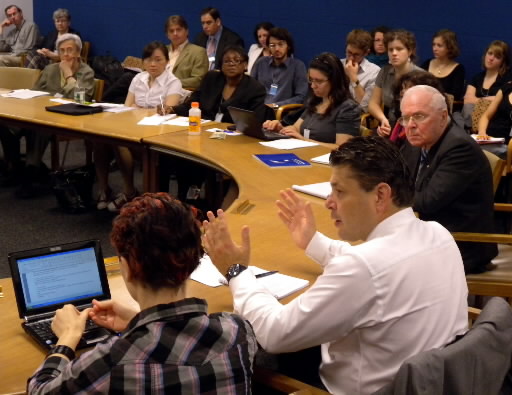Nuclear Weapons Can Be Eliminated: Chapter 11, Part 2
Jun. 8, 2010
Chapter 11: 2010 NPT Review Conference
Part 2: For nuclear disarmament, success and disappointment
by Yumi Kanazaki, Staff Writer
Draft takes step backward with each revision, but produces results on "nuclear weapons convention"
The Nuclear Non-proliferation Treaty (NPT) Review Conference, which is held every five years, has adopted a final document with an action plan of 64 items in pursuit of nuclear disarmament, non-proliferation, and the peaceful use of nuclear energy. However, there were concerns that the discussions, which took place over a period of four weeks, from May 3-28, at United Nations Headquarters in New York, might break down, as they did at the review conference five years ago, if a wrong move was made. The Chugoku Shimbun reflects on the developments, including actions taken behind the scenes, of this year's NPT Review Conference, which has managed to sustain the international momentum for nuclear disarmament.
Arguing for the realization of the total elimination of nuclear weapons by 2025, the representative of Egypt appealed again for a deadline for nuclear abolition in the closing discussion of May 28, the day the Nuclear Non-proliferation Treaty (NPT) Review Conference ended. His speech on behalf of the Non-Aligned Movement (NAM) summed up the frustration and indignation felt by many NAM nations at the fact that a "target year" for nuclear abolition had disappeared from the final document.
On May 14, when the four-week session approached its midpoint, the initial draft of the final document was presented and it read: "The Secretary-General of the United Nations is invited to convene an international conference in 2014 to consider ways and means to agree on a roadmap for the complete elimination of nuclear weapons."
The five nuclear weapons states, however, were fiercely opposed to this provision. France, in particular, firmly insisted that the proposal would be pointless if not feasible. The nation's vehemence even prompted, outside the venue, such whispers as "If any nation ends up the cause of the conference breaking down, it will be Iran or France" and "France is said to be ready to block the passage of the draft, using the Fifth Committee of the U.N. General Assembly, which considers the U.N. budget."
Nuclear disarmament held "hostage"
The United States, under the Obama administration, which is pursuing "a world without nuclear weapons," also put up firm resistance to contents of the draft that would constrain its nuclear policy. With each revision, the draft was watered down. First, the year "2014" was removed and, in the end, the idea of holding the conference itself disappeared. Alexander Marshik from Austria, the chair of Subsidiary Body 1, expressed his feelings in an interview with the Chugoku Shimbun that he had hoped to preserve the time frame as a government's representative, apart from his position as a subcomittee chair.
Of the three fields covered by the NPT, namely nuclear disarmament, nuclear non-proliferation, and the peaceful use of nuclear energy, nuclear disarmament took the biggest step backward in comparison to the targets set in the initial draft. U.N. diplomatic sources explained that nuclear disarmament became a "hostage" so that both the nuclear weapon states and non-nuclear weapon states could extract concessions from one another and win good results in the other areas.
Efforts by NGOs
Meanwhile, this NPT Review Conference was characterized by a strong, new proposal seeking to ensure progress toward nuclear abolition: the proposal for a nuclear weapons convention.
Each morning, nongovernmental organizations (NGOs) of the United States and other nations invited governments' representatives to a room at U.N. headquarters that was used as their base during the conference, and continued to exchange views with them. NGOs, in this way, forcefully called on each nation to conduct the start of negotiations for a nuclear weapons convention, their primary goal this time.
However, the nuclear weapon states, with the exception of China, were united again in their resistance. On May 19, a U.S. representative expressed irritation and said that the idea of a nuclear weapons convention did not sit well with them.
Eventually, the words "consideration of negotiations" on a nuclear weapons convention barely managed to survive in the final document with its 64-item action plan. Tim Wright, who is involved in the International Campaign to Abolish Nuclear Weapons and has also repeatedly contacted those close to U.N. Secretary-General Ban Ki-moon, an enthusiastic advocate for this treaty, analyzed that this was evidence the international community has become unable to ignore growing support for the treaty.
This outcome was the result of the joint efforts of NGOs, the United Nations, and several governments. The phrase "consideration of negotiations" is very short, but it holds great significance.
(Originally published on June 4, 2010)
To comment on this article, please click the link below. Comments will be moderated and posted in a timely fashion. Comments may also appear in the Chugoku Shimbun newspaper.








